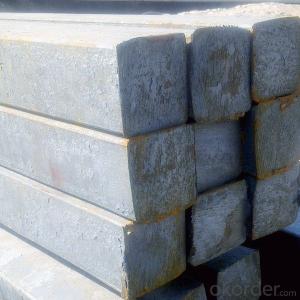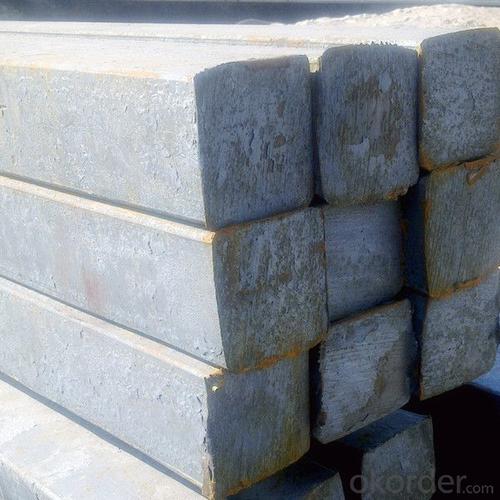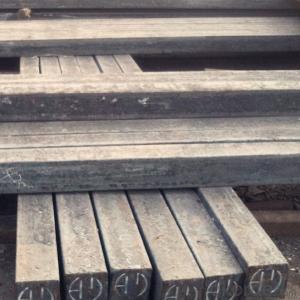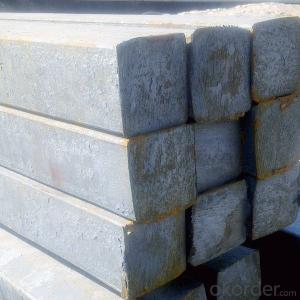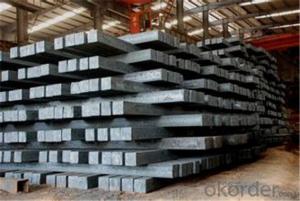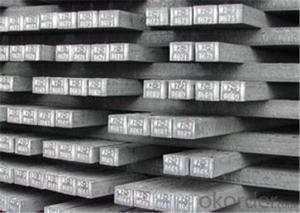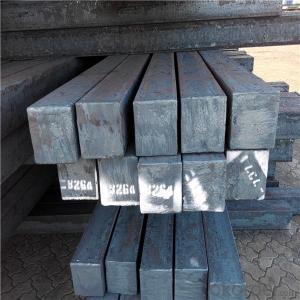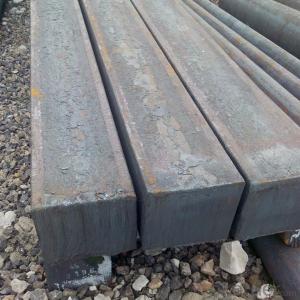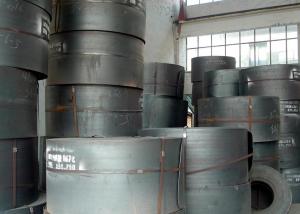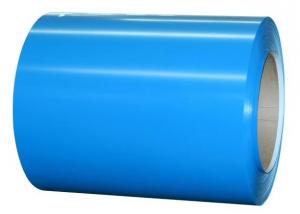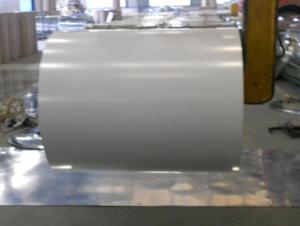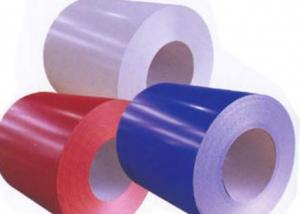Alloy Steel Billets 3sp/5sp Made in China
- Loading Port:
- China main port
- Payment Terms:
- TT OR LC
- Min Order Qty:
- 1000 m.t.
- Supply Capability:
- 100000 m.t./month
OKorder Service Pledge
OKorder Financial Service
You Might Also Like
Specification
Product Description
Various Standards Mild Steel Billet, Square Billet
1.Specifications
Type | Steel billet / Square steel/ Steel square bar |
Standard grade | 3SP/PS, 5SP/PS, Q195, Q235, Q255, Q275, 20MnSi etc. |
MOQ | 1000 MT |
Technique | Hot rolled, Continuous casting and rolling |
Size | 50*50mm ~ 160*160mm |
Length | 3~12m |
Packing | Loose packing, in bundle |
Payment terms | T/T, L/C at sight, Usance L/C |
Trade terms | EXW, FOB, CFR, CIF |
Trans terms | FIO, FILO, FLT |
Inspection | Third party inspection accepted |
Delivery time | 15-30 days, according to the quantity |
Applications | carbon structural steel, wire rod, rod, deformed bars, profile steel, machine parts, and steel moulds etc . |
Note | Customized service is available (for sizes,length and chemical components etc.). |
2.Steel Grade:
Steel Grade | C % | Mn % | Si % | S % | P % |
Q195 | 0.06-0.12 | 0.25-0.50 | 0.30 Max | 0.04 Max. | 0.04 Max. |
Q235 | 0.12-0.22 | 0.30-0.60 | 0.30 Max. | 0.04 Max. | 0.04 Max. |
Q255 | 0.18-0.28 | 0.40-0.70 | 0.30 Max. | 0.045 Max. | 0.050 Max. |
Q275 | 0.27-0.38 | 0.50-0.80 | 0.30 Max. | 0.045 Max. | 0.045 Max. |
3SP | 0.14-0.22 | 0.40-0.85 | 0.15-0.30 | 0.050 Max. | 0.040 Max. |
5SP | 0.28-0.37 | 0.50-1.00 | 0.15-0.30 | 0.050 Max. | 0.040 Max. |
20MnSi | 0.17-0.25 | 1.00-1.60 | 0.40-0.80 | 0.050 Max. | 0.050 Max. |
3. Products Picture
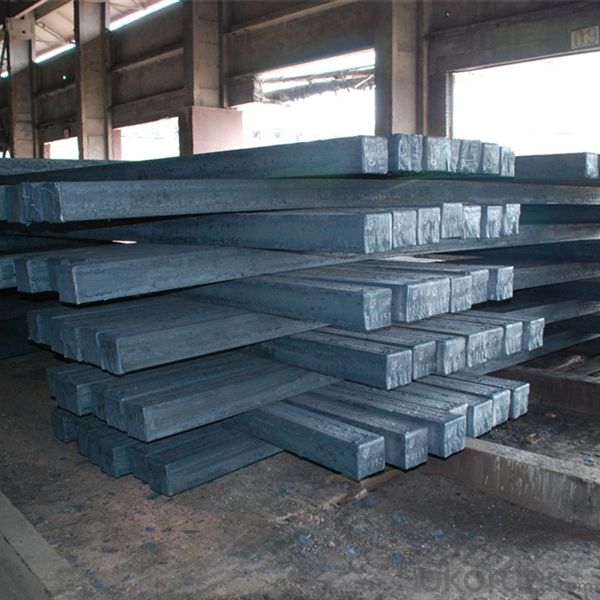
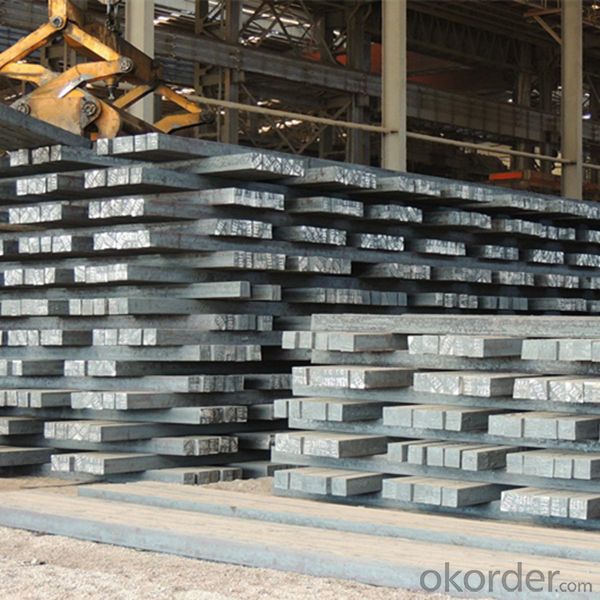
4.Trading Process
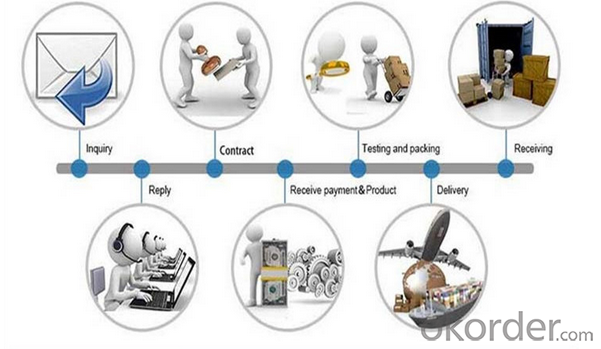
5.Why choose us:
1. More than 10 years experience in this industry
2. 100,000 tons exporting per month
3. Professional foreign trade team
4. OEM&ODM capacity
5. High quality assured & competitive price
6. Try our best to meet your needs & save your budget
7. Very popular in Southeast Asia, Africa, Mid-East and South America etc.
8. VIP membership system, first time customers and long-term cooperation customers can get extra discount on some products.
- Q: What are the challenges and innovations in the steel product manufacturing industry?
- The steel product manufacturing industry faces various challenges and innovations. One significant challenge is the increasing demand for sustainability and environmental responsibility. Companies are required to adopt greener manufacturing processes, reduce carbon emissions, and minimize waste. Innovations in this area include the development of more efficient energy usage and the use of recycled materials. Another challenge is the need for cost-effective production while maintaining high-quality standards. Manufacturers are constantly seeking innovative ways to improve efficiency, such as implementing automation and robotics in their production processes. This helps to reduce labor costs, increase productivity, and ensure consistent product quality. Furthermore, the industry is also challenged by the need to adapt to changing market dynamics and customer demands. Manufacturers must be agile and responsive to market shifts, such as fluctuations in raw material prices or changes in consumer preferences. Innovations in this area include the use of advanced data analytics and market intelligence tools to anticipate and respond to market trends. To stay competitive, steel product manufacturers must embrace technological advancements and invest in research and development. Innovations in materials science, including the development of stronger and lighter alloys, can lead to improved product performance and expanded application possibilities. Overall, the steel product manufacturing industry is driven by the challenges of sustainability, cost-effectiveness, market dynamics, and technological advancements. Embracing innovation and finding solutions to these challenges will determine the success and growth of companies in this sector.
- Q: What are the different types of steel products used in the manufacturing of jewelry and accessories?
- There are several types of steel products commonly used in the manufacturing of jewelry and accessories. These include stainless steel, surgical steel, and carbon steel. Stainless steel is a popular choice due to its durability, corrosion resistance, and affordability. Surgical steel, often used in body jewelry, is hypoallergenic and resistant to tarnish. Carbon steel, though less common, is sometimes used for its strength and unique aesthetic appeal.
- Q: What are the different types of steel wire and their uses?
- There are several types of steel wire used for various purposes. Some common types include carbon steel wire, stainless steel wire, and galvanized steel wire. Carbon steel wire is strong and versatile, commonly used in construction, manufacturing, and fencing. Stainless steel wire is corrosion-resistant, making it suitable for applications in the food industry, medical equipment, and marine environments. Galvanized steel wire is coated with a layer of zinc, providing resistance against rust and used for applications like wire ropes, fencing, and electrical wiring.
- Q: How is steel forgings machined for precision components?
- Steel forgings are machined for precision components through a process called machining, which involves removing excess material from the forged steel to achieve the desired shape and dimensions. Machining techniques such as turning, milling, drilling, and grinding are used to create precise and intricate features on the forgings. This process ensures that the steel components meet the required specifications and tolerances for their intended applications.
- Q: What are the different methods of testing the quality of steel products?
- There are several methods used to test the quality of steel products, including destructive and non-destructive testing techniques. Destructive methods involve physically damaging the steel sample, such as tensile testing to measure strength and ductility, hardness testing to assess its resistance to indentation, and impact testing to determine its toughness. Non-destructive methods, on the other hand, allow for evaluation without causing any damage, such as ultrasonic testing to detect internal defects, magnetic particle inspection to identify surface cracks, and visual inspection to assess overall appearance and dimensional accuracy. These various testing methods help ensure the quality and integrity of steel products in different aspects.
- Q: What are the advantages of using steel in the manufacturing of solar panels?
- There are several advantages of using steel in the manufacturing of solar panels. Firstly, steel is a strong and durable material, providing excellent structural support and protection to the delicate solar cells. It can withstand harsh weather conditions, extreme temperatures, and resist corrosion, ensuring the longevity of the solar panels. Additionally, steel is a widely available and cost-effective material, making it an ideal choice for large-scale production of solar panels. It is also highly recyclable, promoting sustainability and reducing environmental impact. Overall, steel enhances the efficiency, reliability, and affordability of solar panels, making them a viable and sustainable energy solution.
- Q: What are the applications of steel in the pharmaceutical industry?
- Steel is commonly used in the pharmaceutical industry for various applications. One significant application is in the manufacturing of equipment and machinery used for processing, packaging, and storing pharmaceutical products. Steel's durability, strength, and resistance to corrosion make it suitable for constructing tanks, vessels, mixers, and pipes that are necessary for pharmaceutical manufacturing processes. Additionally, steel is utilized in the construction of cleanrooms, where drugs are formulated and sterilized, due to its ability to maintain a controlled and sterile environment.
- Q: How is steel pipe welded for structural applications?
- Steel pipe is commonly welded for structural applications using various welding techniques such as electric resistance welding (ERW), submerged arc welding (SAW), or gas metal arc welding (GMAW). These methods involve applying heat and pressure to join two or more sections of steel pipe together, ensuring a strong and durable bond.
- Q: What are the different types of steel staircases and handrails available?
- There are several types of steel staircases and handrails available, including straight staircases, spiral staircases, curved staircases, and floating staircases. Handrail options include traditional straight handrails, curved handrails, and wall-mounted handrails. These various types of steel staircases and handrails cater to different architectural styles and personal preferences.
- Q: What are the different types of steel cables and their uses?
- There are several types of steel cables, each designed for specific purposes. Some common types include galvanized steel cables, which are corrosion-resistant and often used for outdoor applications like fences and suspension bridges. Stainless steel cables are highly resistant to rust and often used in marine environments, as well as in construction and architecture. Aircraft cables, made of high-strength carbon steel, are used in aviation and heavy lifting applications. Lastly, wire ropes, composed of multiple steel wires twisted together, are utilized in various industries for lifting, towing, and rigging purposes.
Send your message to us
Alloy Steel Billets 3sp/5sp Made in China
- Loading Port:
- China main port
- Payment Terms:
- TT OR LC
- Min Order Qty:
- 1000 m.t.
- Supply Capability:
- 100000 m.t./month
OKorder Service Pledge
OKorder Financial Service
Similar products
Hot products
Hot Searches
Related keywords
